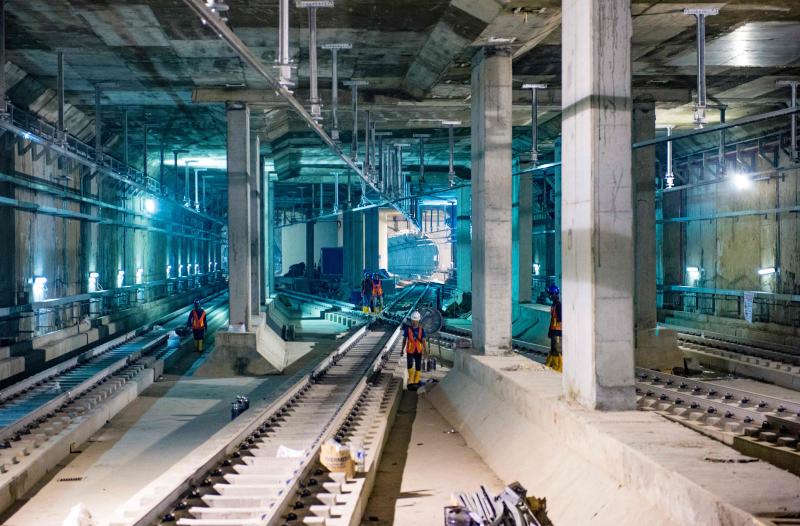Indonesia's first MRT to start running in March, easing Jakarta's traffic congestion
Sign up now: Get insights on Asia's fast-moving developments

Engineers and workers in a tunnel of Jakarta's MRT construction project on June 7, 2018.
PHOTO: AFP
JAKARTA - Indonesia's first mass rapid transit (MRT) rail system is on track to begin operating from March next year, giving 170,000 commuters a day the opportunity to avoid the capital's horrendous traffic jams.
Nearly 95 per cent of the 15.7-kilometre route - with 13 stations along the way - was completed by the end of last month.
The city-owned MRT operator has said it will begin the first round of tests next month (Aug) to ensure that the signalling and control rooms function properly, and this would be followed by full and integrated tests involving trial runs of the trains in December.
The MRT network runs from the densely populated residential area of Lebak Bulus, in the south of Jakarta, to the HI roundabout in the city centre where prime office buildings and five-star hotels are located. The service will comprise 16 trains and every six-car train will run in five minute-intervals during rush hour and ten minutes during other times.
"The MRT service will reduce the travel time between Lebak Bulus and the city centre to 30 minutes from one-and-a-half hours now," said William Sabandar, president director of MRT Jakarta, the municipal government-owned company tasked to operate the service.
He was speaking to journalists, including The Sunday Times, who were taken on a tour of an underground station in the city centre on Thursday.
The company operating the MRT has also been commissioned to build supporting facilities such as shops at the stations after construction of the network - mainly funded by the Japan International Cooperation Agency - is fully completed.
Private investors are now being encouraged to take part in the project, especially in developing the commercial areas at and near the stations. They are also expected to play a role in the future when the network is expanded to cover more residential areas of Jakarta.
Representatives from the Overseas Private Investment Cooperation (OPIC), a US institution that mobilises private investment in emerging economies to help address development challenges, who also visited the nearly-completed MRT network on Thursday (July 12), praised its progress and pledged future support.
"OPIC will continue to partner with Indonesia... to support transformative infrastructure projects like the MRT that will serve the people of Indonesia well into the future," executive vice president David Bohigian told reporters.
OPIC provided US$120 million in financing for Indonesia's first wind power farm, with a 75 megawatt capacity, in South Sulawesi which President Joko Widodo recently inaugurated.
MRT Jakarta has proposed to the government that the train fare be between 3,000 rupiah and 12,000 rupiah. The company expects most passengers will pay 8,500 rupiah for a 10-km trip. No final decision has been made on the fare structure.
The Jakarta city government is heavily subsidising the running of the train network, promising to make up for any shortfalls in MRT Jakarta's future operating cash flows, said Mr William .
"We are trying to talk to the government to let us charge a fare that allows us to operate in a commercial way, but which is not too burdensome to passengers. If the fare is too low, it will be difficult for us to raise it in the future," Mr William said.
He added that the company would also rely on the revenue stream from other sources such as from advertising and rents from retail space to ensure long-term sustainability.
It has so far agreed in principle to connect the basements of 50 office and commercial buildings to the underground areas of stations.
The first feasibility study for an MRT network in Jakarta was commissioned in the 1990s during the Suharto era. The project, however, was hit by delays, including as a result of the 1997/1998 Asian financial crisis and many rounds of fruitless dialogue between the national and local governments.
The groundbreaking ceremony did not occur until September 2015.


